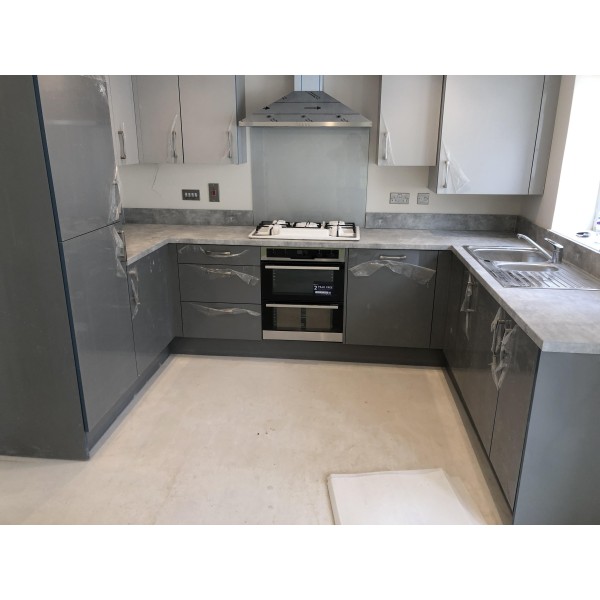Extension Builders in Treherbert
Search Extension Builders in places nearby
Understanding the Role of Extension Builders in Treherbert
In the picturesque village of Treherbert, nestled in the Rhondda Valley of Wales, the demand for home extensions has been on the rise. This trend has led to the emergence of skilled extension builders who are transforming homes to meet the evolving needs of families. These professionals play a crucial role in enhancing living spaces, adding value to properties, and preserving the unique charm of Treherbert.
The Growing Need for Home Extensions
As families grow and lifestyles change, the need for additional space becomes apparent. Whether it's a new bedroom, a larger kitchen, or a home office, extensions offer a practical solution. In Treherbert, where the community is tight-knit and moving house isn't always the preferred option, extending existing homes is a popular choice.
Benefits of Home Extensions
- Increased Living Space: Extensions provide much-needed room for growing families.
- Enhanced Property Value: A well-executed extension can significantly boost a home's market value.
- Customised Living Areas: Homeowners can tailor extensions to suit their specific needs and tastes.
- Preservation of Community Ties: Staying in the same neighbourhood maintains social connections.
Choosing the Right Extension Builder
Selecting the right builder is crucial to the success of any extension project. In Treherbert, homeowners have access to a range of experienced professionals who understand the local architecture and building regulations.
Key Considerations
- Experience and Expertise: Look for builders with a proven track record in similar projects.
- Local Knowledge: Builders familiar with Treherbert's unique characteristics can offer valuable insights.
- Reputation and Reviews: Check online reviews and ask for references from previous clients.
- Transparent Pricing: Ensure the builder provides a clear and detailed quote.
Planning and Designing Your Extension
Before construction begins, careful planning and design are essential. This stage involves working closely with architects and builders to create a blueprint that meets both functional and aesthetic goals.
Steps in the Planning Process
- Initial Consultation: Discuss your vision and requirements with the builder.
- Site Assessment: Evaluate the existing structure and land for feasibility.
- Design Development: Collaborate with architects to draft design plans.
- Approval and Permits: Obtain necessary permissions from local authorities.
Understanding Building Regulations and Permits
In Treherbert, as in the rest of the UK, building regulations ensure that extensions are safe and sustainable. Navigating these regulations can be complex, but experienced builders can guide homeowners through the process.
Common Regulations to Consider
- Structural Integrity: Ensuring the extension is stable and secure.
- Energy Efficiency: Meeting standards for insulation and energy use.
- Fire Safety: Incorporating necessary fire prevention measures.
- Accessibility: Making sure the extension is accessible to all.
Materials and Sustainability in Extensions
Choosing the right materials is vital for the longevity and sustainability of an extension. In Treherbert, builders often use materials that complement the natural surroundings and traditional architecture.
Popular Materials for Extensions
- Brick and Stone: Durable and aesthetically pleasing, these materials blend well with existing structures.
- Timber: Offers a natural look and is often used for eco-friendly builds.
- Glass: Used for modern designs, providing natural light and a sense of openness.
- Recycled Materials: Increasingly popular for sustainable construction.
The Construction Phase: What to Expect
Once planning and design are complete, the construction phase begins. This stage involves transforming plans into reality, with builders working diligently to complete the project on time and within budget.
Stages of Construction
- Site Preparation: Clearing and preparing the site for building.
- Foundation Work: Laying the groundwork for a stable structure.
- Structural Build: Erecting walls, roofs, and other key components.
- Finishing Touches: Completing interior and exterior details.
Managing Costs and Budgeting
Budgeting is a critical aspect of any extension project. Homeowners in Treherbert need to consider various costs, from materials to labour, to ensure the project remains financially viable.
Tips for Effective Budgeting
- Set a Realistic Budget: Consider all potential expenses and set a flexible budget.
- Get Multiple Quotes: Compare quotes from different builders to find the best value.
- Plan for Contingencies: Allocate funds for unexpected costs.
- Track Expenses: Keep a detailed record of all expenditures.
Ensuring Quality and Safety
Quality and safety are paramount in any building project. In Treherbert, extension builders adhere to strict standards to ensure that every project is completed to the highest quality.
Quality Assurance Measures
- Regular Inspections: Conducting inspections at key stages of construction.
- Skilled Workforce: Employing experienced and qualified tradespeople.
- Use of Quality Materials: Sourcing materials from reputable suppliers.
- Compliance with Standards: Adhering to all relevant building codes and regulations.
Post-Construction: Final Checks and Handover
Once construction is complete, a series of final checks ensure that the extension meets all specifications and standards. This stage is crucial for addressing any last-minute issues before the handover.
Final Steps
- Inspection and Snagging: Identifying and rectifying any minor defects.
- Client Walkthrough: Reviewing the completed work with the homeowner.
- Documentation and Warranties: Providing necessary paperwork and guarantees.
- Project Handover: Officially transferring the completed extension to the homeowner.
Maintaining Your New Extension
After the extension is complete, regular maintenance is essential to preserve its condition and functionality. Homeowners in Treherbert can take several steps to ensure their new space remains in top shape.
Maintenance Tips
- Regular Cleaning: Keep the extension clean to prevent wear and tear.
- Inspect for Damage: Regularly check for signs of damage or wear.
- Address Repairs Promptly: Fix any issues as soon as they arise to prevent further damage.
- Schedule Professional Inspections: Have a professional assess the extension periodically.
Frequently Asked Questions
- How long does a typical home extension take to complete? The duration varies depending on the size and complexity of the project, but most extensions take between three to six months.
- Do I need planning permission for an extension in Treherbert? It depends on the size and scope of the extension. It's best to consult with local authorities or your builder.
- Can I live in my home during the construction of an extension? In most cases, yes, but it may depend on the extent of the work being done.
- What are the most common types of home extensions? Popular extensions include kitchen extensions, loft conversions, and single or double-storey additions.
- How can I ensure my extension is energy efficient? Use high-quality insulation, energy-efficient windows, and sustainable materials.
- What should I do if I encounter problems with my builder? Communicate openly with your builder to resolve issues, and if necessary, seek advice from a professional mediator.
Embracing the Future with Extension Builders in Treherbert
Extension builders in Treherbert are not just constructing additional rooms; they are crafting spaces that enhance the quality of life for residents. By understanding the needs of the community and adhering to high standards of quality and safety, these builders are ensuring that Treherbert remains a vibrant and desirable place to live. As more homeowners embrace the possibilities of home extensions, the village continues to grow and evolve, blending tradition with modernity in a harmonious way.

















